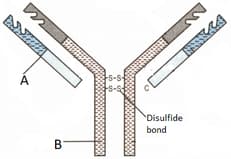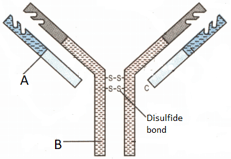Immunity
Immunity: Overview
This topic covers concepts, such as Immunity, Innate Immunity, Acquired Immunity, Active Immunity, Passive Immunity, Cellular Barriers, Inflammatory Reaction, Complement System, Cytokine Barriers, Antigen, Antibody, Immunoglobulin-A, etc.
Important Questions on Immunity
A flower containing anther and filament would be:
The two special types of lymphoid organs in humans are:
The type of immunity that is present at the time of birth in humans is:
Consider the following four statements (i-iv) regarding kidney transplant and select the two correct ones out of these.
(i) Even if a kidney transplant is proper the recipient may need to take immune suppressants for a long time.
(ii) The cell mediated immune response is responsible for the graft rejection.
(iii) The B lymphocytes are responsible for rejection of the graft.
(iv) The acceptance or rejection of a kidney transplant depends on specific interferons.
The two correct statements are:
Lysozyme is present in perspiration, saliva and tears. It destroys
Hormone produced against allergic reaction is
Immature lymphocytes are primarily found in which one of the following organs?
Which one of the following is considered as a protective mechanical barrier in the body of an individual?
Assume a population that has reached herd immunity for an infectious disease. If an infected individual is introduced to this population, which of the following is most likely to occur?
In the figure below, the structure of an antibody molecule is shown. The part A and B are

Which of the following antigen is present on the red blood corpuscles of O blood group?
Which of the following antibody is present in mother's milk?
When ready-made antibodies are directly given to protect the body then the immunity is called?
The antibodies produced due to reaction with allergy is_____
Which one of the following immune processes is most effectively controlled by anti histamines
In the figure below, the structure of an antibody molecule is shown. The part A and B are

Which one of the following statements is incorrect with respect to human antibodies?
